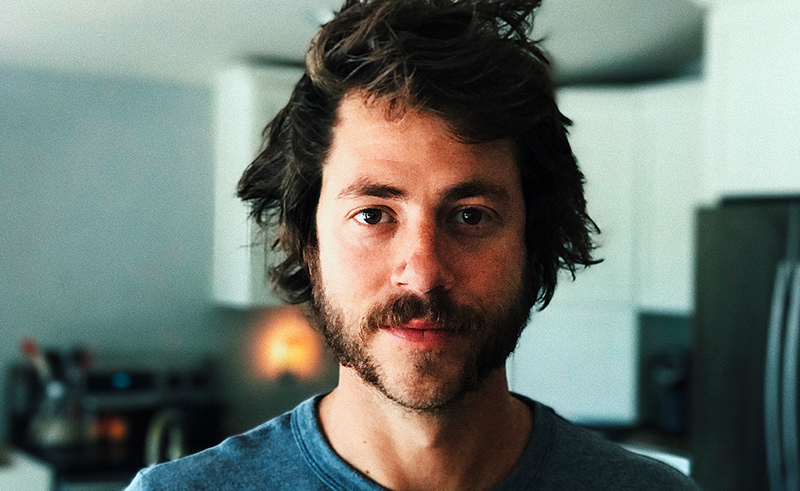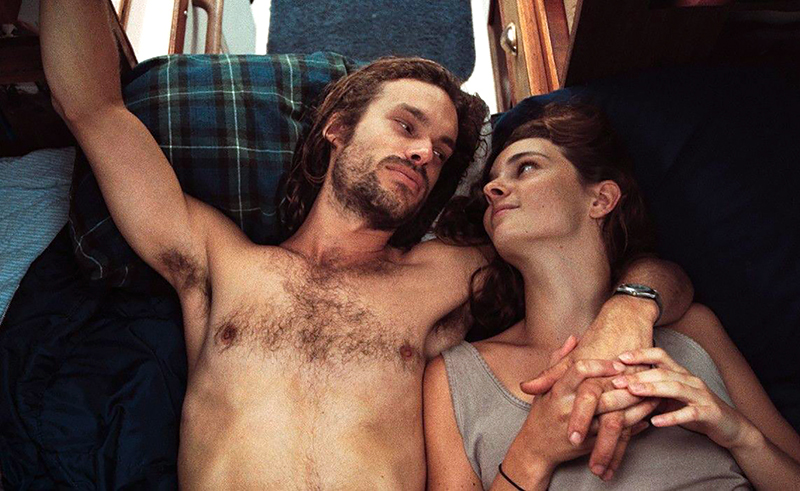
He passed up a sailing adventure for love and art, and so far, it’s working out nicely. Lake Lotawana native Trevor Hawkins, 35, released his debut feature film, Lotawana, across multiple streaming services recently, instantly garnering a “certified fresh” rating from Rotten Tomatoes and an endorsement on Instagram from actor Jason Momoa.
Hawkins graduated from Lee’s Summit North and attended Metropolitan Community College – Longview in Lee’s Summit. In 2010, he launched a film company, Mammoth, and has produced commercials, documentaries, tourism and wildlife films and TV shows.
IN Kansas City caught up with Hawkins by video call from his waterfront home at Lake Lotawana the morning his film was released to talk about giving up one dream to chase another, three movies that changed his life, and the story behind the sailboat in the movie.
Why didn’t you go to film school?
I didn’t think there were any film schools locally that I would benefit from for the money I would have to invest, so I skipped that part and just went straight into it.
What is the elevator version of the Trevor-starts-making-films-without-film-school story?
I picked up a camera in high school and started filming my buddies skateboarding and wakeboarding. I was always more excited about the videos that the pros were putting out than the actual tricks they were doing.
Then, still in high school, at a buddy’s house within one week we watched A Clockwork Orange, Requiem for a Dream and Donnie Darko. All three of those movies blew my mind. From then on, I knew that I wanted to be a filmmaker, and I wanted to be in production of my first feature film by the time I was 30.
I think I was in my late 20s when I turned to my wife and said, “How long does it take to make a movie? I wonder if we should get started now?”
We wrote a script, and mortgaged our house to pay for it, and here we are.
Lotawana is about this guy who’s trying to drop out and live in nature. That’s certainly not your story. How do you relate to Forrest, the protagonist?
The movie very much deals with the themes I was battling at that time. I bought a sailboat with a buddy, and we planned on sailing around the world for four years. I knew going would force me to give up on my goal of becoming a filmmaker, and I had just met my wife. So, I had to make the choice: Do I go on this grand, isolated adventure in the wild or do I stay home and invest in a long-term future and something that means a little more, to me at least?

Without giving too much away, reality kind of crashes down on the characters, but then there’s a beautiful, uplifting montage at the end that signals optimism, that there is a way out. Is that what you intended?
I think so. I didn’t want the movie to be a lesson to people to not try alternative lifestyles and adventurous things. So, the movie kind of dives, but that montage is meant to kind of turn back up at the end. So, all right, things didn’t work out for these people, but maybe they should have done some things differently. Throwing everything to the wind and living on a sailboat is hard, but there are ways to do it right and ways to do it wrong.
It took you six years to make this film. A lot happened in the world in that time.
It has been an eventful six years. [Laughs]
Did your vision for the movie change in response to events unfolding?
It didn’t because it’s a pretty timeless tale. Lotawana works for any generation and any time. But what really helped was, because of Covid and everyone having to hide huddled up in their houses, everyone had to learn how to stream things. That really helped open the doors to Lotawana releasing across multiple streaming platforms.
There’s a strong theme in the movie about connecting to nature. Does that come from growing up proximate to it at the lake?
For sure. Nature is one of the most important things in my life. Growing up at the lake I was surrounded by it. I’ve been a nature nut my whole life. My wife and I rehabilitate wildlife. You see that bruise? On Saturday I got attacked by a barn owl. It got a talon in my face, millimeters from my eye.
There will never be a movie I make that isn’t kind of one with nature. I think connecting with how we became these evolved beings that came from this wild planet that is right in front of us is so important. It centers me as a person.
‘‘Nature is one of the most important things in my life. Growing up at the lake I was surrounded by it. I’ve been a nature nut my whole life.”
My wife and I are also birders, and I know during the pandemic, birding numbers skyrocketed. I think that’s great. The more we can get people connected to nature, the more resources we can flow into protecting it.
The scenery in the film is so beautiful, did you have any concerns that it would distract people from the human story?
I’m hoping the beauty entices people into thinking this is something they want to do themselves. In the first half of the movie, if I paint this beautiful picture of this life in nature, that draws people in. Then when everything crashes down, the viewer will be even more affected, like, “Oh my gosh, I fell for this whole thing, too.” I don’t want to say, “fell for it”—I think there are ways to make it work. People live in nature all the time, in a cabin in the woods or on a sailboat. But the way this particular couple did it was probably a bit immature, romanticized, idealized, not grounded in reality. The movie is a cautionary tale about that kind of thinking.
Is the sailboat in the movie your sailboat?
It was up until a few months ago. We sold it, unfortunately. It was sitting in my driveway forever because we can’t put sailboats that big on [Lake] Lotawana, so we shot half the movie on Lake Jacomo, two miles down the road. It was just getting destroyed sitting in our driveway, so my wife and I made the tough decision to sell it so it could have a life with somebody.
Even though you forwent the global sailing adventure, taking out a mortgage on your house to finance a movie is not a conventional, play-it-safe move. Was there a moment where you weren’t sure if that was going to work out?
There are actually two that come to mind. One moment was when we lost our lead actress halfway through shooting. We were sitting there in the production office, thinking we couldn’t do anything, and we had all this money invested and this whole schedule lined out. But we scrambled and moved everything around and made it work.
Then, after the movie was wrapped, I had been spending so much time on the movie that I hadn’t been doing commercial work. There was a time my wife and I got pretty tight with our finances and had to really get some commercial work coming in, and we pulled ourselves out of that as well.
There’s an irony to the main character in Lotawana checking out by living on a boat, but the boat is on a landlocked lake in the middle of a continent. That lake is also the place you choose to call home. Do you experience wanderlust, and if so, what form does it take?
I’ve been on a lot of adventures when I was younger, huge sailing trips, huge hiking trips, huge camping trips. And now I have a one-year-old…
That’s an adventure.
Yeah, yeah! So now the way I’m excited about fitting nature into our lives is trips with the family and friends. The best experiences I’ve ever had in my life have been when I’ve gone with friends out into nature. I really don’t care about traveling to cities. Every time I travel, I want it to be into the wild somewhere.
Where are some of your favorite places to travel to?
Oh my gosh, everywhere. I love Missouri. Missouri has incredible float-trip spots and camping spots. My wife and I were taking a hike recently and we stirred up an old conversation we’ve had about how the Missouri woods in winter are so overlooked, but it has such a subtle, serene beauty to it. The Pacific Northwest is incredible. New England. As long as I’m in the wild, I’m where I need to be.
What’s next for Trevor Hawkins?
I have a movie called Lunker that I would like to get made. It’s also a Missouri movie, but it’s a dark comedy/horror film set within the competitive largemouth-bass fishing culture of the 1970s. I imagine I’ll be shooting it down in the Ozarks.
That sounds like fun.
[Laughs] Yeah, it’s pretty far out. It’s quite a bit different than Lotawana but I’m excited about it.
Interview condensed and minimally edited for clarity.


